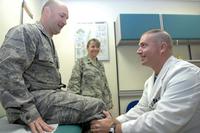Army Maj. Gen. Richard W. Thomas, newly assigned as chief medical officer and director of healthcare operations for the new Defense Health Agency (DHA), acknowledges that some TRICARE patients and their civilian physicians face lab fee challenges that the DHA needs to address.
A year ago TRICARE, the military's health insurance program, quietly stopped reimbursing civilian laboratories for more than 100 genetic or laboratory-developed tests (LDTs). Some of the tests are critical for patient care and, in fact, routinely are still ordered by military physicians.
Among patients frustrated by disparity of coverage is retired Air Force Lt. Col. Robert Prouhet who is fighting a blood cell cancer called acute promyelocytic leukemia. His civilian oncologist in Colorado orders a special blood test for him every 110 days. The PML/RAR Alpha Translocation Analysis Monitoring Test is the most sensitive available to track this type of leukemia for patients in remission. The alternative is a bone marrow biopsy, which is more expensive and invasive and therefore more risky, Prouhet said.
His oncologist, Prouhet said, told him he would consider "it malpractice if he did not use this test to monitor and treat my cancer."
Prouhet felt the financial string of lost TRICARE coverage last summer when the laboratory sent him a bill for $1148 for the blood test his oncologist ordered in May. While appealing the charge to TRICARE, Prouhet learned he could avoid additional out-of-pockets costs by asking the hospital at nearby Peterson Air Force base to request the lab test for his oncologist. That's because military treatment facilities don't face the same restriction on LDTs.
"We're got a situation where we are doing some of these in some of the MTFs and [yet] won't pay for them in the [purchased care] network. That is a disparity [and] we don't want to be there," Maj. Gen. Thomas explained in a phone interview.
It's also true, he said, that some of the LDTs that TRICARE no longer covers represent "standard of care in medication."
The DHA, he said, is working on solutions.
As reported here a month ago, TRICARE stop reimbursing for many of these tests a year after the American Medical Association revised Current Procedural Terminology (CPT) codes for genetic tests. The new codes gave greater transparency on the kinds of testing TRICARE was paying for.
With hundreds of genetic tests developed every year, Defense health officials decided to use an existing regulation to tighten coverage and force labs to have tests screened for safety and effectiveness through the Food and Drug Administration (FDA).
Absent FDA approval, Thomas affirmed, "by law…we can't pay for these tests" even if they've become a standard for care and despite military physicians still being allowed to order tests "not fully FDA approved."
"The good news is this change in the law has helped us to identify that there is a lag in FDA approval for some of these more commonly-used tests in many cases," Thomas said.
In rejecting Prouhet's final appeal for payment Dec. 24, a lawyer for the Department of Defense cited not a law but a TRICARE regulation that bans coverage of "unproven" medical devices and procedures. LDTs are deemed unproven now by TRICARE because they cannot be lawfully marketed across state lines without approval of the FDA.
Laboratories that developed the tests haven't sought FDA approval in part because they haven't had to do so. Civilian insurance companies, Medicaid and even, for some tests, Medicare haven't required it.
Thomas, an ear, nose and throat surgeon who served for a time as surgeon general for U.S. forces in Afghanistan, said he wants to close the gap between LDTs military physicians can order and TRICARE coverage.
The new Defense Health Agency, an operational level command with greater authority than the TRICARE Management Activity it replaced, is "perfectly designed to address some of these issues, including these disparities," Thomas said.
Step one, already begun, is to gather information on each LDT not covered by TRICARE including frequency of use, how much TRICARE previously paid for it and military physicians ordered it. That will allow DHA, he said, "to identify the nifty 50 or top couple of dozen, understanding that many of these things have become the standard of practice on medications."
For those tests DHA will seek expedited review by FDA.
TRICARE did set up a limited demonstration project on LDTs in 2011, inviting manufacturers of certain tests not approved by FDA, but covered by Medicare or Medicaid, to submit them for special review. Two were found significant for clinical decision-making on cancer treatments and were approved quickly by FDA to allow continued TRICARE coverage.
DHA wants something like that process revived and expanded, Thomas said, to expedite FDA approval of LDTs that are beneficial to care management, while protecting beneficiaries from tests that lack sufficient evidence of clinical validity and usefulness.
The American Clinical Laboratory Association (ACLA), which lobbies on behalf of laboratories being impacted by tightened TRICARE coverage, has opposed subjecting genetic testing to new hurdles of review.
"The FDA does not require LDTs to go through FDA approval. So why would laboratories submit their LDTs for approval to an agency that does not require them to do so," said Julie Khani, a vice president for the ACLA.
"We are also concerned that TRICARE is imposing standards that are outside of industry norms," said Karen Ruedisueli, a health care advocate for National Military Family Association. She called TRICARE worries over the safety of these tests "a red herring" given that FDA has not moved to strengthen its oversight and commercial insurers and Medicaid cover them.
But giving all LDTs "a free wave is not the answer," Thomas said. "What we have to do is just push [the best of] them to the front and hope we get the FDA to approve these for us in an expedited manner."
Send comments to Military Update, P.O. Box 231111, Centreville, VA, 20120, email milupdate@aol.com or twitter: Tom Philpott @Military_Update









